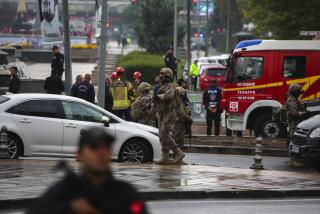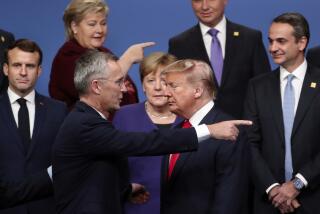NEWS ANALYSIS : Ignoring Foes, Turkish Leader Takes a Gamble : Western alliance: For the moment, Ozal seems to be riding high on America’s coattails.
- Share via
ANKARA, Turkey — In Muslim Turkey, which looks West from a tough and noisy Middle East neighborhood, Saturday was a time of counterpoint: the howl of war-bound American jets and shrill official silence to mark their passage.
U.S. Air Force planes staged new strikes against northern Iraq from Turkey’s Incirlik Air Base for the second day, according to Western diplomats and Turkish reporters at the base. And, for the second day, there was no official confirmation that the big NATO base near the city of Adana was being used to mount attacks.
The government of President Turgut Ozal has authorized the strikes. Its reluctance to acknowledge that they are actually occurring underlines a gap between Ozal and the majority of Turks that is approaching crisis character. For Turkey, an emerging front-line role in the war poses a blend of danger and opportunity that is profoundly divisive.
In supporting war as firmly as he did the sanctions against Iraq, Turkey’s southern neighbor, Ozal is gambling against history and in defiance of his political opposition, public opinion and Turkey’s fiercely nationalistic and noninterventionist armed forces.
Despite internal divisions he has fueled, the 64-year-old Ozal, who rules Turkey with autocratic elan, is at least for the moment riding high on American coattails.
“My opposition tells me I am a gambler. I am not a gambler,” Ozal told a television interviewer. “I am a calculating man. I calculate everything. I am an engineer. I know mathematics and logic, and therefore, I don’t think I will lose.”
Ozal is calculating that the United States will force Iraq from Kuwait and in the process force President Saddam Hussein from power in Iraq. He is also betting his political life that Hussein, facing half a million U.S.-led troops to his south, will not attack Turkey’s even bigger army across Iraq’s northern border.
“If Iraq is logical, it will not attack Turkey. If they do, we will respond firmly . . . first in the air and then on the ground,” said Ozal, who insists that Turkey will not fight unless attacked.
Ozal argues that promised American military and economic assistance, together with Turkey’s enhanced international reputation and strengthened friendships with wealthy anti-Hussein Arab governments offset the domestic risks of his go-for-it policies.
For four decades, Turkey was important to the West as the North Atlantic Treaty Organization partner with the longest border with the expansionist Soviet Union. With the end of the Cold War, though, Turkey’s geopolitical value diminished. Future partnerships seemed suddenly uncertain for a nation of 57 million that thinks of itself as a Western democracy but is Muslim, mostly in Asia, no stranger to military coups and still part of the Third World economically.
The aftermath of war, though, is bound to scramble Middle East relationships. Ozal envisions Turkey as the centerpiece of any post-crisis scenario: a respected, stable, regional superpower.
“Turkey wants to be invited to the victory banquet, not to be on the menu,” said one Ozal Cabinet minister.
Ozal’s world view is challenged in every quarter.
“Turkey is practically in the war,” charged the True Path Party of former prime minister and vintage Ozal foe Suleiman Demirel.
A recent poll for Ozal’s Motherland Party showed 74% opposed to Turkey’s entry into the war, Turkish newspapers reported Saturday. The decision to allow U.S. strikes from Incirlik triggered a flight of residents from the nearby city of Adana. Well-to-do Turks in Ankara sent their families to safety following rumors that Iraq would attack the capital.
“Turkey is opening itself to an attack. Who will shoulder the responsibility if Saddam’s chemical and biological weapons explode over Turkey tomorrow and thousands of our citizens face harm?” columnist Emin Colasan demanded Saturday in the national newspaper Hurriyet.
Remember history, commentators in an overwhelmingly hostile press urge Ozal: Turkey, which had ruled Arabia for 400 years, was suckered into World War I by Germany and lost all. Since then, it has been a conspicuous and successful neutral in Middle Eastern trauma, most recently remaining on good terms with both Iraq and Iran during their 1980-88 war.
Remember geography, urge politicians. Turkey will have to live with Iraq long after the Americans have gone home.
“Even if Turkey is not attacked, the wound that will exist between Turkey and the Arab nations will not be easily healed,” said former Prime Minister Bulent Ecevit of the Democratic Left Party.
The armed forces, which have staged three coups in the past three decades when Turkey’s visceral politics spun out of control, are noninterventionist by training and conviction. The generals make no secret that they consider permission for U.S. air strikes from Turkey a mistake that could draw their country into war. Turkish bloodshed would ruin Ozal, and perhaps jeopardize democracy.
Not wanting the blame if the war turns bad, the armed forces are keeping a clear distance from the government--and making sure that everybody in Turkey knows it.
More to Read
Sign up for Essential California
The most important California stories and recommendations in your inbox every morning.
You may occasionally receive promotional content from the Los Angeles Times.













